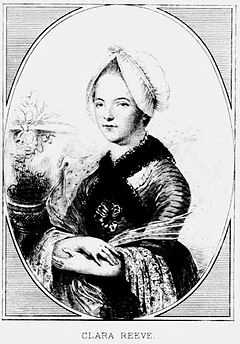CLARA REEVE
Clara Reeve (1729-1807) was an English writer. She was born in Ipswich and was educated, as she wrote in a letter to a friend, mainly by her father. After the death of her father she started writing and translating. Her novels include The old English baron (1777), after the example of Horace Walpole’s The Castle of Otranto, and the epistolary novel The school for widows (1791). She also wrote a history of prose fiction titled The progress of romance (1785). This work is supplemented by the Oriental tale ‘The history of Charoba, queen of Egypt’.
The fragments:
In her The progress of romance (1785), Reeve presents conversations between three friends, Hortensius, Euphrasia and Sophronia about the history and contemporary situation of prose literature. They especially compare the genres of the romance and the novel. According to them, the former is inherited from the Moors and in Europe reached its culmination in the 17th century, with the French ‘histoires galantes’. In these ‘enlightened’ times, however, it is relegated to the taste of their grandmothers. The romance is a heroic fable, staging fabulous persons, while the ‘modern’ novel is a picture of real life, in everyday language. It is so persuasive, that the reader has the feeling that what is told is real and could happen to his neighbour. The conversations also cover the ‘Eastern tale’ and the Thousand and one nights, which are examples of ‘wild and extravagant’ literature, ‘far out of the bounds of Nature and probability’. They are fascinating to some extent, but they have to be rejected, since because of their excessive imagination they are dangerous for the youth. It is significant that the essay is divided into evenings and has the form of a conversation, like the structure of the Thousand and one nights. The treatise is interesting, too, as a reflection of literary debates and tastes at the time, particularly the turn from the fantastic tale to the realist novel. It is also interesting, of course, that it was written by a female author, illustrating the involvement of women in English literature in the 18th century. ‘The history of Charuba’ is an Oriental tale written by Clara Reeve herself. The story is about Charuba, the daughter of Totis, the king of Egypt in ancient times, who meets Abraham’s wife Hagar. After Totis’ death, Charuba inherits the throne, but a tribe of giants settles in Egypt and threatens to usurp the kingdom. As a ruse, Charuba demands from the king of the giants, Gebirus, to build a city on the place of Alexandria. During the day the giants build the city, but at night nymphs from the Nile destroy it, so as to endlessly postpone the completion of the town. Then a shepherd falls in love with one of the nymphs. Gebirus dresses himself as the shepherd and finds out the secret of Charuba. The tale is not a pastiche of the Thousand and one nights, but contains several motifs of Nights’ stories, such as the giants, the jinniyyas and the king dressing up as a poor lad.

Sources/references:
John William Cousin, A short biographical dictionary of English literature, J.M.Dent & Sons, London 1910.
Ros Ballaster, Fabulous Orients; fictions of the East in England 1662-1785, Oxford University Press, Oxford etc., 2005.
Martha Pike Conant, The Oriental tale in England in the eighteenth century, Octagon Books, New York 1966.
Muhsin Jassim Ali, Scheherazade in England; a study of nineteenth-century English criticism of the Arabian nights, Three Continents Press, Washington 1981.
Weblinks:
http://www.gutenberg.org/author/Reeve,+Clara (Project Gutenberg)
http://archive.org (Internt Archive)
http://librivox.org/author/5301 (Libri Vox Audiobooks)